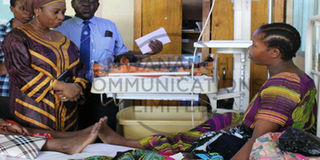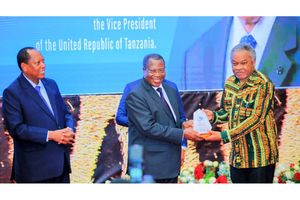African scientists develop methods to avert outbreaks

The Minister for Health, Community Development, Gender, Elderly Persons and Children, Ms Ummy Mwalimu (left) speaks to a mother of newly born twins, Ms Yunitha Vincent, when she visited Tanga’s Bombo Hospital yesterday. African scientists are making efforts to devise methods of making early detection of viral outbreaks. PHOTO | BURHAN YAKUB
What you need to know:
The researchers—who include Tanzanians, want to wage war on epidemics of life-threatening viral diseases—such as Ebola—by creating mechanisms that would mimic the way anti-terror agencies are trying to curtail global terrorist networks.
Dar es Salaam. Researchers on infectious diseases in Africa are now devising methods that could help overcome disease outbreaks.
The researchers—who include Tanzanians, want to wage war on epidemics of life-threatening viral diseases—such as Ebola—by creating mechanisms that would mimic the way anti-terror agencies are trying to curtail global terrorist networks.
The World Health Organisation came under fire last year when it failed to respond quickly to an Ebola outbreak that in the end killed at least 10,000 people and infected nearly 25,000 others in Guinea, Liberia and Sierra Leone.
WHO director general Dr Margaret Chan has since acknowledged the fault, saying, “We [the WHO] can mount a highly effective response to small and medium-sized outbreaks, but when faced with an emergency of this scale, our current systems — national and international — simply have not coped.”
Such a scenario seems to have ignited the spirit of African scientists who want the continent’s think-tanks to design home-grown solutions towards detection of the outbreaks as early as possible and ensuring early interventions.
At a recent meeting organised by Connecting Organisations for Regional Disease Surveillance (Cords), in Arusha, there was a clamour from some health scientists for the creation of a well-established Disease Surveillance System that would be able to cope with the complex nature of the viral diseases on the continent.
Dr Julius Lutwama, a virologist from Uganda’s ministry of Health, is of the view that viruses could have been controlled on the continent, if not for the fact that the bugs keep changing their variation forms.
“The viruses can camouflage in vaccines and drugs. So it becomes difficult to deal with them. This is similar to the struggle faced by anti-terror agencies who have been trying to curb terrorist connections,’’ says the senior research officer who also works with the Uganda Virus Research Institute (Uvri).
Dr Lutwama was convincing his fellow scientists to view viruses as “terror threats.” He said the surest way to deal with these viruses was to try and be innovative and stay ahead of them by creating new technologies.
As the don introduced the topic, his fellow scientists who were in the meeting room waited anxiously for him to explain how the viruses would be combated as terror agents.
Presenting a paper, Dr Lutwama, and his team, brought in the idea of training and deploying rural health workers on the continent’s major hotspots for the outbreaks.
This, they believed, would be more useful and faster than waiting to deploy teams of experts after the outbreak has occurred even in the remotest areas of Africa.
The rural health workers, would then be equipped with electronic systems to report immediately to relevant institutions in case they sensed that there was a case of Ebola, Mar-bug, Rift Valley Fever or any other life-threatening disease in their areas of surveillance.
This, according to them, is like using a network of good citizens who can report any suspicious terrorist networks to relevant authorities for immediate intervention.
Speaking at the same meeting, an expert on epidemics from the Sokoine University of Agriculture, Prof Mark Rweyemamu, noted that Tanzania would have to deal with the tide of globalisation, climatic change and human activities which fuel the spread of the outbreaks across borders.




